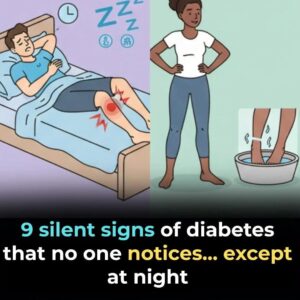Diabetes doesn’t always show obvious symptoms during the day — sometimes, your body sends subtle warning signs while you sleep.
These nighttime symptoms are often overlooked, but recognizing them early can make a huge difference in managing or even preventing diabetes complications.
Here are 9 important signs that may appear at night and what they mean for your health.

1. Frequent Nighttime Urination (Nocturia) 
If you find yourself waking up multiple times to use the bathroom, it may be a sign of high blood sugar. When glucose levels are elevated, your kidneys work harder to filter and remove excess sugar through urine — making you need to go more often, even during the night.
2. Excessive Thirst While Sleeping 
Waking up with a dry mouth or craving water constantly at night can be another red flag. High blood sugar causes dehydration because your body is losing fluids through frequent urination.
3. Night Sweats
Low blood sugar (hypoglycemia), especially in people taking insulin or diabetes medication, can lead to sudden sweating during sleep. These sweats may soak your sheets or cause you to wake up feeling clammy and tired.
4. Restless or Disturbed Sleep 
Blood sugar fluctuations can make it difficult for your body to regulate energy levels at night, leading to tossing, turning, or even insomnia. Poor sleep can also worsen blood sugar control — creating a harmful cycle.
5. Tingling or Numbness in Hands and Feet 
Nerve damage (diabetic neuropathy) can cause tingling, burning, or numbness — sensations that often worsen when you’re lying still at night. This happens due to prolonged high blood sugar damaging the nerves.
6. Unexplained Fatigue in the Morning 
If you sleep through the night but still wake up exhausted, it may be because your blood sugar was unstable while you slept. Constant fluctuations can prevent your body from entering deep, restorative sleep.
7. Increased Hunger During the Night 
Waking up craving food — especially sweets or carbs — can indicate low blood sugar levels. Your body may be signaling that it needs glucose, especially if you’ve taken insulin or diabetes medication too close to bedtime..
8. Blurred Vision in the Evening
High blood sugar causes fluid to move in and out of the eye’s lens, which can temporarily affect your vision. If your eyesight becomes blurry at night, it may be time to check your glucose levels.
9. Leg Cramps or Pain at Night 
Diabetes can cause poor circulation, leading to muscle cramps or sharp pains in your legs and feet. These symptoms often worsen at night when blood flow slows down.
What You Can Do
If you’re noticing any of these symptoms, it’s important to get your blood sugar tested. Maintaining balanced glucose levels through a healthy diet, regular exercise, hydration, and sleep routine can make a big difference.
Avoid eating heavy meals or sugary snacks close to bedtime, and discuss nighttime symptoms with your doctor — they may suggest adjusting your medication or meal plan.
Final Thoughts
Diabetes doesn’t rest while you sleep — and neither should your awareness. Paying attention to these nighttime signs can help you detect the condition early, protect your nerves and organs, and wake up each morning feeling healthier and more energized.









